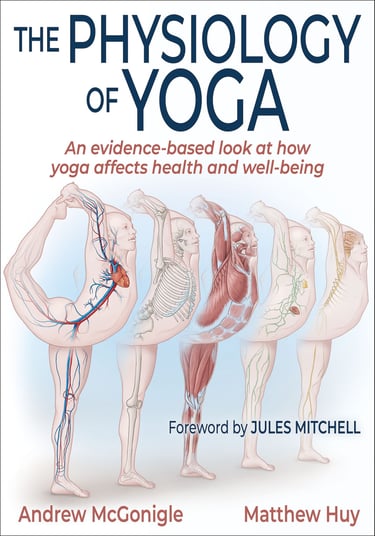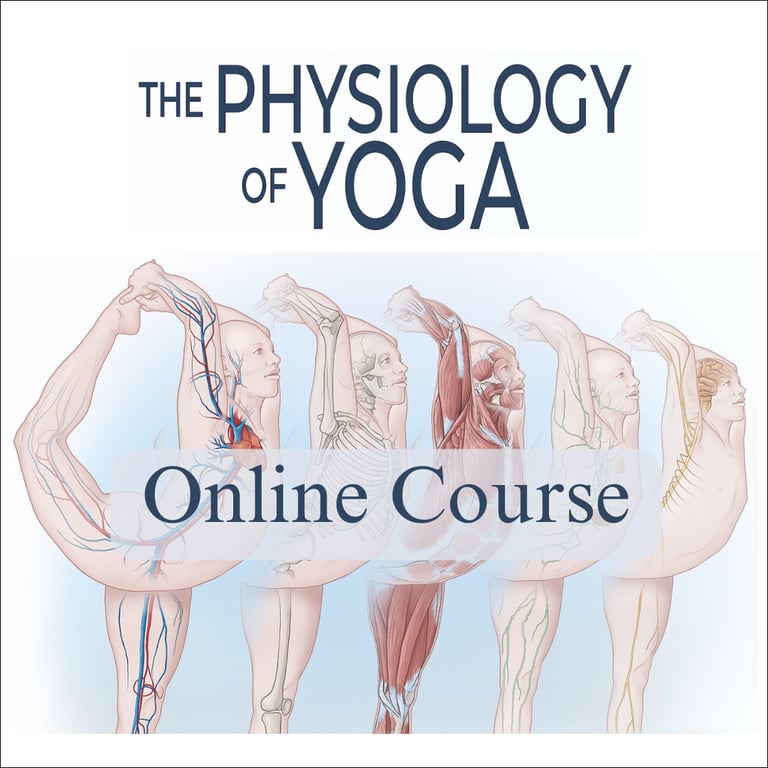A groundbreaking, evidence-based book
Does shoulder stand stimulate the thyroid gland? Do twists detox the liver? Is back pain connected to stress?
With so many differing opinions on how yoga affects the body and many claims about yoga being based purely on speculation, it can be difficult to know who to believe.
The Physiology of Yoga separates fact from fiction by examining how the body responds and adapts to yoga within the major systems of the body: musculoskeletal, nervous, respiratory, cardiovascular, lymphatic, immune, endocrine, reproductive, and digestive.
The popular "Myth or Fact" sidebars put common claims to the test of science, examining questions such as whether inversions increase blood flow to the brain or yin yoga targets the fascia.


From the USA
Human Kinetics
Amazon
For independent bookstores: ISBN 9781492599838
From the UK
Human Kinetics Europe
Amazon UK
Buy the Book
Join the Physiology of Yoga Course
The Physiology of Yoga Course is one of the many courses housed inside the Enlightened Yoga Collective, an online community that helps yoga teachers learn anatomy while also learning how to grow their yoga teaching business!


Prominent Reviews of the Book
Bernie Clark - Yoga Teacher and Author of the Your Body, Your Yoga Trilogy
“This is the book I didn’t know I was waiting for! There are lots of books on yoga and anatomy but very few on yoga and physiology. This book beautifully meets the need. It is extensive and yet very accessible. I am pleased to add it to my library.”
Jenni Rawlings - Co-founder of Strength for Yoga & co-host of Yoga Meets Movement Science Podcast
“At last! A thorough, evidence-based resource (complete with much-needed myth busting!) about the many systems of the body and how a yoga practice interacts with and influences them."
Leslie Kaminoff - Co-author of Yoga Anatomy
“This title fills a long-standing gap in the essential reading lists for yoga teacher training programs. Hopefully, it will prevent yoga teachers from repeating some of the most commonly held myths and misconceptions about the physiological effects of yoga practice.”
Richard Rosen - Yoga Teacher and author
“Every now and then, in the 40-odd years I’ve been practising yoga, I come across a book that makes an invaluable contribution to some aspect of my understanding of yoga. The Physiology of Yoga is just such a book. I give this book my highest recommendation; it’s an essential study guide and reference source for serious students and teachers, and it should be on the recommended reading list of every yoga teacher training program.”
About the Authors
Andrew McGonigle has been studying anatomy for over twenty years, originally training to become a doctor and then moving away from Western medicine to become a yoga teacher, massage therapist and anatomy teacher. He combines all of his skills and experience to teach anatomy and physiology on Yoga Teacher Training courses internationally and runs his own Yoga Anatomy Online Course. His first book, Supporting Yoga Students with Common Injuries and Conditions: A Handbook for Yoga Teachers and Trainees, was published in March 2021. He lives in Los Angeles with his husband. For more information visit: www.doctor-yogi.com


Matthew Huy, originally from the San Francisco Bay Area, was studying biology at university when he enrolled in a dance class upon the whimsical suggestion of a friend. During that course, he discovered an love of movement. He next enrolled in a yoga class and decided he wanted to study movement instead of biology.
Several years later, he completed a BA in Dance and a yoga teacher training at an ashram in India. In 2022, he completed a master's degree in exercise science, focusing on physiology and pain science. His thesis centered on how yoga teachers’ language affects their clients. For more information visit: www.matthewhuy.com










